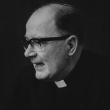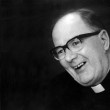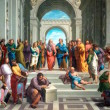The One Cause Behind Everything Else in Reality
by Fr. Robert Spitzer
Filed under The Existence of God

(NOTE: This it the second of a three part series on Bernard Lonergan's philosophical proof for God. Read the first part here. We'll share the third part on Friday.) III. A Reality which is Unrestricted in Intelligibility Must be Absolutely Unique The general argument is as follows: If there were more than one unrestrictedly intelligible reality, there would have to be a difference between the one and the other, and if there were such a difference, then one of the supposedly “unrestricted... Read More
Introducing Bernard Lonergan’s Philosophical Proof for God
by Fr. Robert Spitzer
Filed under The Existence of God

(NOTE: This it the first of a three part series on Bernard Lonergan's philosophical proof for God. We'll share the second and third parts on Wednesday and Friday, respectively.) Introduction Bernard Lonergan was a Canadian Jesuit priest, philosopher, and theologian, regarded by many as one of the most important thinkers of the 20th century. He articulated a philosophical proof for God's existence which may be stated as follows: If all reality is completely intelligible, then God exists. But... Read More
The Death of God and the Loss of Human Dignity
by Bishop Robert Barron
Filed under God, Morality

I am sure by now that many of you have seen the appalling hidden-camera videos of two Planned Parenthood physicians bantering cheerfully with interlocutors posing as prospective buyers of the body parts of aborted infants. While they slurp wine in elegant restaurants, the good doctors—both women—blandly talk about what price they would expect for providing valuable inner organs, and how the skillful abortionists of Planned Parenthood know just how to murder babies so as not to damage... Read More
Can We Actually Know Anything About God?
by Joe Heschmeyer
Filed under The Existence of God

Can we actually know anything about God? This is one of the most fundamental questions, and many people, particularly agnostics, will say “no.” The argument tends to go something like this: God, if there is a God, is so far removed from human experience and knowledge that there’s nothing that we can say about Him (or Her or It). Another variation: the only way to verify our knowledge about God would be to die and find out if Heaven and Hell exist; for those of us still alive,... Read More
The Grammar of Existence
by Steven Rummelsburg
Filed under God's Nature

In this age of scientific and empirical reductionism, when we hear the word “grammar” we are likely to think of what takes place in an elementary classroom. Education in the modern age is a mere shadow of an authentic education. Its constituent parts have been hollowed out and husks are dangled in front of students followed by an assessment of temporary recall of quickly fading shades. Grammar has been reduced to a mere empty shadow of its former self as well. It used to be the primary... Read More
Understanding Who God Really Is
by Thomas M. Cothran
Filed under The Existence of God

NOTE: This is the third and final part of a three part series on classical theism by theologian Thomas M. Cothran. Be sure to read part one and part two. Any defense against Stephen H. Webb’s critique of classical theism must, then, defend some particular form of classical theism that does have an ontology. Webb declares that “Aquinas is the best representative of what is often called classical theism,”1 and so for the remainder of this article, we will consider whether Webb’s... Read More
A Bad Case Against Classical Theism
by Thomas M. Cothran
Filed under The Existence of God

NOTE: This is the second of a three part series on classical theism by theologian Thomas M. Cothran. Read part one here. Stephen Webb not only misstates what classical theists believe, he misstates why they believe it. Consider, by way of example, Webb’s review of David Bentley Hart’s The Experience of God. Webb claims that Hart infers “the main tenets of classical theism … from the deceptively simple premise of God’s immateriality.” Webb attributes a similar line of... Read More
What is Classical Theism?
by Thomas M. Cothran
Filed under The Existence of God

NOTE: This is the first of a three part series on classical theism by theologian Thomas M. Cothran. Over the last few years, Stephen H. Webb has waged a crusade of sorts against classical theism, especially with respect to its notion of divine transcendence. Webb has authored, by my count, no less than 10 articles on the subject at First Things1, and similar critiques have also been central to his books Mormon Christianity and Jesus Christ, Eternal God. Perhaps surprisingly, Webb... Read More
Does “Atheology” Exist?
by Dr. Edward Feser
Filed under God

In his brief and (mostly) tightly argued book God, Freedom, and Evil, Alvin Plantinga writes: "[S]ome theologians and theistic philosophers have tried to give successful arguments or proofs for the existence of God. This enterprise is called natural theology… Other philosophers, of course, have presented arguments for the falsehood of theistic beliefs; these philosophers conclude that belief in God is demonstrably irrational or unreasonable. We might call this enterprise natural... Read More
The Splendor of Thomistic Theism
by Karlo Broussard
Filed under The Existence of God

NOTE: This is the second of a two-part series. Read part 1 here. With the accidentality and priority of being for sensible things now in place, there is only one preliminary metaphysical principle that we need to establish before we can defend Premise 1 (from the first part in this series) and that is the fact that every particular thing—whether sensible or non-sensible (immaterial)—whose being is accidental and prior to its nature must receive being from an agent outside itself, i.e.,... Read More






